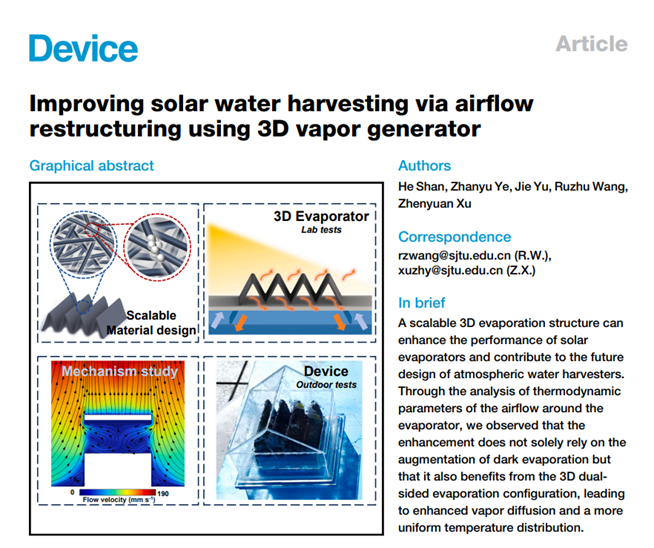
News

News
The innovation team ITEWA (Innovation Team for Energy, Water & Air) led by Prof. Ruzhu Wang from School of Mechanical Engineering at Shanghai Jiao Tong University, published a research paper titled "Improving solar water harvesting via airflow restructuring using 3D vapor generator" in the Cell sister journal the Device. The paper analyzed the enhancement in the evaporation rate and efficiency of 3D origami-type evaporators under laboratory and outdoor conditions, which helps the understanding and future design of solar evaporator and atmospheric water harvester.

The water crisis profoundly impacts the well-being and sustainable development of the global population. Exploring unconventional water resources has emerged as a viable solution to alleviate freshwater scarcity, where solar evaporation provides a zero-energy and environmentally friendly approach. While this technology has demonstrated promising results, there remains a performance and scalability gap between in-lab testing and their use in real-world conditions. Recent research has proven that a scalable 3D evaporation structure can enhance the performance of solar evaporators and contribute to the future design of atmospheric water harvesters. However, the enhancement mechanism in the evaporation rate and efficiency of 3D origami-type evaporators under laboratory and outdoor conditions remain unclear. Through the analysis of thermodynamic parameters of the airflow around the evaporator, this paper concludes that the enhancement does not solely rely on the augmentation of dark evaporation but that it also benefits from the 3D dual-sided evaporation configuration, leading to enhanced vapor diffusion and a more uniform temperature distribution. This understanding could match the gaps between the lab tested results and the practical performance of solar evaporator, paving a pathway for next-generation large-scale implementation of solar desalination technology.
The first author of this paper is the PhD student He Shan, from the Institute of Refrigeration and Cryogenics, working under the supervision of Prof. Ruzhu Wang. He has contributed to research publications in journals such as Nature Communications, Joule, and Advanced Materials, all within the domain of the energy-water-food nexus. Prof. Ruzhu Wang and Associate Prof. Zhenyuan Xu serve as the corresponding authors for this paper.
Prof. Wang Ruzhu's innovation team in the field of energy-water-air has long been committed to addressing fundamental scientific problems and key technologies at the forefront of the interdisciplinary intersection of energy, water, and air. Their aim is to achieve comprehensive solutions at the material-device-system level through interdisciplinary approaches, driving breakthroughs in related fields. In recent years, the team has published a series of interdisciplinary papers in high-level journals such as Science, Nature Communications, Joule, EES, Advanced Materials, and more.
Paper Links:

Shanghai Jiao Tong University
Address: 800 Dongchuan Road, Shanghai
200240